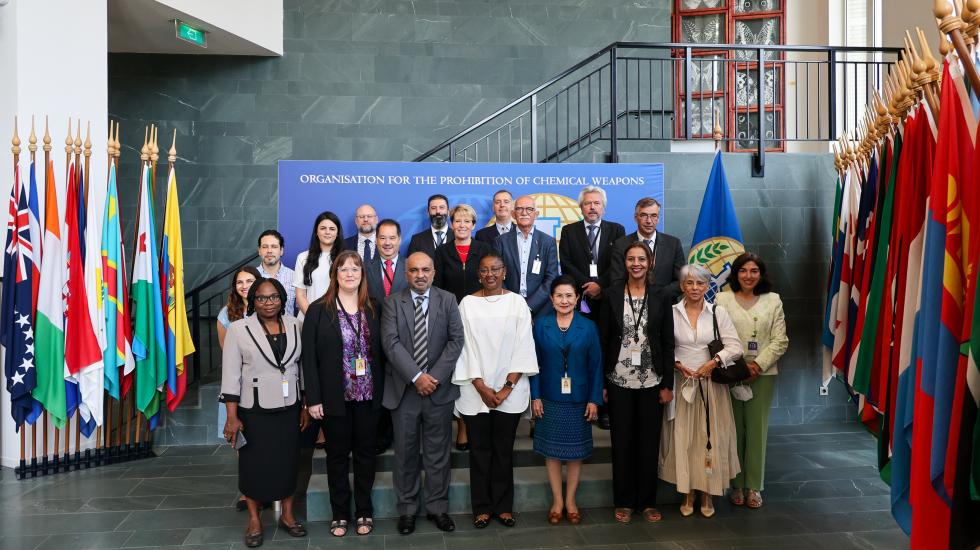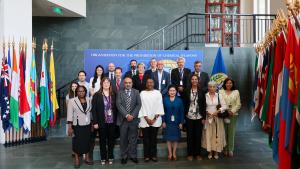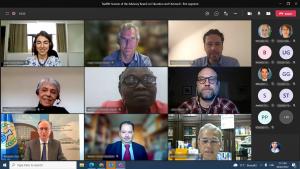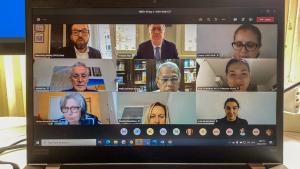The Advisory Board on Education and Outreach (ABEO) provides specialised advice in areas of education and outreach relevant to the OPCW’s mandate.
Its goal is to ensure that the Organisation’s education and outreach activities, and those of States Parties, are effective, sustainable, cost-effective, and benefit from the latest advances in education and outreach theory or practice. Such advice may be provided to the Director-General, to the policy-making organs and, at their request, to States Parties.
The ABEO provides advice on the development of education and outreach strategies, key messages and partnerships that support the implementation of the Convention. The board also identifies global education and outreach activities relevant to the Convention and those related to disarmament and non-proliferation. The specialised advice that the board provides is with the goal of making education materials accessible to audiences in order to benefit the broadest range of target stakeholders.

The OPCW Advisory Board on Education and Outreach
A Group of Independent Experts
ABEO members serve in a personal capacity (not as representatives of their respective governments) and serve no more than two three-year terms, which may be consecutive. The chair and vice-chair are elected by the members of the ABEO.
The Board is made up of 15 independent experts in subjects including education in science, technology, engineering, mathematics and other relevant disciplines, science communication, the chemical industry, dual/multiple-use issues related to chemistry and the life sciences, ethics and the Convention, and related international measures.
Members (and observers) of Advisory Board on Education and Outreach
Dr Graciela Alicia González (Argentina) is a Doctor from the University of Buenos Aires in the Chemical Sciences area, a Specialist in Chemical and Environmental Sciences and a Bachelor of Chemical Sciences, degrees issued by the Faculty of Exact and Natural Sciences (FCEN) of the University of Buenos Aires (UBA) – Argentina.
Dr Gonzalez is currently an Independent Researcher of CONICET (National Council for Scientific and Technical Research), Adjunct Professor of Department of Inorganic, Analytical and Physical Chemistry (DQIAQF – FCEN – UBA) currently performing her duties at the Institute of Physical Chemistry of Materials, Environment and Energy (INQUIMAE- UBA/CONICET) and Trainer of the Judicial School of the Judicial Council of Tucumán – Argentina.
Her teaching activities include the chemistry of natural aqueous systems and chemical analysis in forensic investigation. In research, with numerous publications she has directed and directs projects and doctoral theses on the analysis of interphases and transport oriented to analytical applications of compounds of environmental interest in industrial processes.
Dr Craig Cormick (Australia) is the former President of the Australian Science Communicators, and has worked in science communication and education for more than 30 years. He has managed education and outreach programmes for agencies including the Commonwealth Scientific and Industrial Research Organisation (CSIRO) and the Australian Department of Industry, Innovation and Science. He specialises in the drivers of public attitudes towards science and technologies, innovative methods of engagement, and his research has been published in journals of Nature and Cell. He is also the author of the book, The Science of Communicating Science: the Ultimate Guide (2019). He is now serving as a member of ABEO for the second term.
Dr Jason Openo (Canada) currently serves as the Director of Teaching and Learning at Medicine Hat College and as an Assistant Lecturer in the University of Alberta’s online Graduate School of Library and Information Studies, where he teaches leadership and management principles. He co-authored Assessment Strategies for Online Learning: Engagement and Authenticity, published by Athabasca University Press (2018). His other writings on postsecondary education have been published in Between Truth and Falsity: Liberal Education and the Arts of Discernment, the Journal of Education for Library and Information Science, The Canadian Journal for Learning and Technology, and Canadian Perspectives on Academic Integrity. Dr. Openo acquired his Bachelor of Arts in Political Science from Albion College, where he participated in the Gerald R. Ford Institute for Leadership in Public Policy and Service, obtained his Master of Library and Information Science from the University of Washington’s Information School, and he holds a Doctor of Education in Distance Education through Athabasca University (2021), where he was awarded the Outstanding Distinction Award for graduate students and the Graduate Citizenship Award for his work with non-profits in Southeast Alberta. He has led award-winning technology projects, and his research interests include high-quality online learning experiences, micro-credentials, and competency-based assessments in online learning contexts.
Prof. Magda Lidia Bauta Solés (Cuba) – Chairperson 2023 – holds a PhD in Political Science from the University of Havana. She is Professor at the Higher Institute of International Relations of Havana, Cuba, where she teaches Multilateralism, Disarmament and Non-Proliferation. She has tutored university theses on the Chemical Weapons Convention (CWC), chemical disarmament and other disarmament topics and has published articles on all of these subject matters.
She worked in the Ministry of Foreign Relations of the Republic of Cuba, and represented Cuba in the Conference on Disarmament in Geneva (Switzerland) during the negotiations on the Convention for the Prohibition of Chemical Weapons (1988-1995). She was Deputy Director of Multilateral Political Affairs of the Cuban Foreign Ministry (1995-1997) until she joined the Preparatory Commission of the Organization for the Prohibition of Chemical Weapons (The Hague, Netherlands). She worked in the International Cooperation and Assistance Division (ICA) at the OPCW, where she headed the Implementation Support Branch (IPB) from 2000 to 2008. During her tenure, important programmes were developed to promote chemical disarmament and the implementation of the Chemical Weapons Convention, including National Authorities meetings and training courses in all areas relevant to the implementation of the CWC. During her tenure at IPB, the first electronic tools for education on chemical disarmament and the implementation of the CWC were developed; important outreach projects aimed at promoting chemical disarmament among, inter alia, legislators (Inter Parliamentary Union), customs officials (Montreal Protocol, Green Customs Initiative), academia and others were developed. Thanks to her experience in the promotion of chemical disarmament and CWC implementation, Dr Bauta Solés, represented the OPCW in the Second, Third and Fourth working sessions of the United Nations Group of Experts for Education on Disarmament and Non-Proliferation.
Dr Ladislava Navratilova (Czech Republic) is a scientist and senior lecturer actively involved in international education. She was a member of the NATO (North Atlantic Treaty Organisation) “CBRN Minimum Standards and Non-Binding Guidelines Working Group” (2014-2017) which developed and published training handbooks for first responders. Her main current educational task is to guarantee and lead OPCW courses for first responders and coordinate international cooperation. She contributed to increase chemical safety via leading projects and trainings mainly in Africa (establishment of the regional CBRN training centre for East African Community in Uganda) and South America (training courses for Paraguayan first responders). Since 2005 she has organized various face-to-face and online OPCW training courses and projects for which she created methodology and specific guidelines. She has been deeply involved in the activities of the Assistance and Protection Branch, OPCW.
Dr Navratilova is a chemical expert and emergency responder in the Population Protection Institute, General Directorate of the Fire Rescue Service of the Czech Republic. One of her scientific tasks is to develop methodologies for the protection of population in case of chemical incidents. Her main duty is to serve as a member of a Chemical Emergency Response Unit. She is responsible for sampling, on-site identification and laboratory analysis. As a member of the emergency team, she also tests the most suitable equipment and technique and then recommends it to the first responders. She holds a doctorate in civil protection from University of Defence in Brno, Czech Republic.
Prof. Dr Christopher Daase (Germany) is Professor of International Relations at Goethe University Frankfurt (Germany), and Deputy Director of the Peace Research Institute Frankfurt (PRIF) where he heads the research department on “International Security”. His research and teaching focuses on security policy (especially wars and civil wars, terrorism and radicalization, non-proliferation and arms control) as well as international institutions. Dr. Daase studied political science, literature, philosophy and art history in Hamburg, Freiburg and Berlin and conducted doctoral research as a SSRC-MacArthur Fellow in International Peace and Security at Harvard University and the RAND Corporation. He chairs the Research Advisory Board of the German Institute for International and Security Affairs (SWP) in Berlin, is co-founder of the Arms Control Negotiation Academy (ACONA), and member of the Executive Board of the EU Non-Proliferation and Disarmament Consortium, where his responsibilities include e-learning courses. Dr. Daase has published several books and numerous articles in international journals and was editor of the leading German international relations journal for more than ten years. From 2022 to 2024, he will serve as dean of the Faculty of Social Sciences at the University of Frankfurt.
Prof. Rocael Hernández Rizzardini (Guatemala) received his PhD in Computer Science from Graz University of Technology (Austria). He is the Director of Galileo Educational System at Galileo University, which works with worldwide partners in the development of educational e-learning projects, technology, and research in virtual education. He is a research scientist and through the GES Research Center works on issues of computer science such as system interoperability, web technologies, Semantic Web, accessibility, and virtual education. He has worked as a consultant and director of international projects for e-learning and web technologies, with extensive experience in projects in several countries in Latin America, the United States, and Europe. He serves as the Telescopio project director, a MOOC courses initiative in Latin America and works towards future growth strategies. He coordinated the work of the ABEO Temporary Working Group on e-Learning and is now serving as a member of the Advisory Board on Education and Outreach for the second term.
Prof. Mohd Jamil Maah (Malaysia) is a professor of chemistry at the University of Malaya (UM) specializing in the field of inorganic chemistry particularly in the coordination chemistry of organophosphorus compounds. He is a permanent member of National Committee on Chemical Weapons Convention, Malaysia. He is also a committee member, facilitator, and subject-matter expert for the Development of a National Code of Conduct for Biosecurity, Malaysia. He is actively involved in chemical education and has been a consultant to several ministries and industries in Malaysia. Prof Mohd Jamil is a Fellow of the Malaysia Academy of Sciences, a Fellow of the Royal Society of Chemistry (UK), and a Member of the Malaysia Institute of Chemistry. He has held several academic administrative positions at University of Malaya, including Head of Department, Directors and Dean of several establishments in UM and Deputy Vice Chancellor (Research & Innovation) and Deputy Vice Chancellor (Academic & International). He was Chairman of the Malaysia Chemistry Olympiad Committee and headed several scientific committees involving government ministries and societies. During 2013-2014, he was seconded to the Ministry of Science, Technology and Innovation (MOSTI) as Undersecretary of the BIOTECH Division. He is now serving as a member of the Advisory Board on Education and Outreach for the second term.
Dr Nezha Barakate (Morocco), holds a PhD in Electrochemistry and Analytical Chemistry. Currently works at the National Institute of Hygiene in Rabat where she holds the position of chemical safety and security manager in addition to her technical contributions as responsible for the analysis of chemicals.
She has a profile of a research supervisor and trainer and a member of several national committees: member of the National Commission for the Convention on the Prohibition of Chemical Weapons, member of the National RNBC Committee, regional expert and member of the steering group of project 35 relating to waste management, member of the National Committee for the Homologation of pesticides and chemical safety officer at her institute.
Internationally, she contributed to the organization and participation of several workshops, in particular with SNL, BEP, ORNL, CSP and UNICRI. Mostly specific to chemical safety and Security, especially those in favor of the promotion of gender equality and the empowerment of women working in chemistry-related fields and greater visibility of their achievements.
Among her recent work is the international Twinning Project with Sandia National Laboratories where she conducted a 6-month project on the safety and security of chemicals and resulted in the training of biosafety managers in her institution.
Recently, she participated as member of the international organizing committee for the 6th International CBRN Safety and Security conference.
Prof. Janefrances Ngozi Ihedioha (Nigeria), is a Professor of Analytical and Environmental Chemistry at the University of Nigeria, Nsukka (UNN). Her research interests include distribution, fate and effect of chemical contaminants and toxicants in biological and environmental matrices; examining bioaccumulation, food-chain transfer, human exposure and risk assessment. She has published several articles in reputable peer-reviewed journals, attended several conferences and workshops, reviewed articles for many journals and is currently a member of Editorial Board of Human and Ecological Risk Assessment – an International Journal.
Prof. Ihedioha is a member of Chemical Society of Nigeria (CSN), Institute of Chartered Chemist of Nigeria (ICCON) and Organisation of Women in Science for Developing World (OWSD). She was the immediate past Treasurer and the current Financial Secretary, Chemical Society of Nigeria, Enugu State Chapter. She was a onetime Chairman of Faculty Scholarship Board committee, and Secretary of Faculty Publication committee of the Faculty of Physical Sciences, UNN. She is currently the Postgraduate coordinator at the Department of Pure and Industrial Chemistry, University of Nigeria, Nsukka.
Mr Shahab Ud Din (Pakistan) has served in the Ministry of Foreign Affairs as Director General and Director of Disarmament. He has participated in various bilateral and multilateral forums including national and international seminars on the Chemical Weapons Convention (CWC) and arms control issues. He has extensive experience in national and international legislative measures in chemical trade monitoring. He regularly produces articles for magazines and journals. He also is involved in training at the national and international level in assistance and protection against chemical weapons. He has been involved in CWC implementation in the country since 2006, and has monitored industrial outreach for OPCW inspections and declarations, safety and security audit and inspections of industrial facilities, and preparation and updating of legislative frameworks. He is also engaged with awareness programmes regarding CWC and its implementation with both industry and academia. He was instrumental in the inclusion of a one-credit chemical safety and security course in master’s level in chemical engineering and chemistry programmes at the national level. He has organised a number of seminars and workshops on CWC implementation, Chemical Safety and Security and education outreach. He holds an MSc degree in Defence & Strategic Studies as well as master’s degrees in English and political science. He is now serving as a member of the Advisory Board on Education and Outreach for the second term.
Prof. Ying Zhou (People’s Republic of China) is a professor at Zhejiang University of Technology, China, where she has been engaged in teaching and research with expertise in analytical chemistry and environmental science since 1993. She teaches courses including Pharmaceutical Analysis, Pesticide Environmental Toxicology, Occupational Hazards and Prevention. She’s about to start a postgraduate course “Chemical Ethics” for postgraduate students of chemistry-related majors at her university, for she has won the 2021 School’s Postgraduate Capacity Enhancement Course (Chemical Ethics) – Building Project. Professor Zhou’s research focuses on the development and application of analytical methods, environmental fate and health effects of chemical contaminants, with over 50 articles published in international peer-reviewed journals. Since 2010 she serves as a member of the National Committee on CWC Implementation. She has been actively involved in CWC implementation to assist chemical enterprises in on-site inspection and declarations, safety and security, publicity and training. She is the executive deputy director of the Spectroscopy and Electrochemistry Committee of Zhejiang Analysis and Testing Association, China. She also serves as an Environmental Emergency Expert in Hangzhou, China. She holds a PhD in Environmental Science and a Master’s Degree in Environmental Chemistry from Zhejiang University, China, as well as a Bachelor’s Degree in Analytical Chemistry from Zhejiang University of Technology, China. As a senior research scholar, she successively shortly visited University of Mississippi, USA (2016) and Natural Products Utilization Research Unit (NPURU) at Agricultural Research Service (ARS) of U.S. Department of Agriculture (USDA) (2019). She did one year of visiting scholar research at the Warsaw University of Technology, Poland (2004-2005).
Prof. Vicente Garrido Rebolledo (Spain), is professor of Public International Law and International Relations and Director of the Chair in Security and Defence Studies “Francisco Villamartín” at the King Juan Carlos University (URJC), Madrid. He is specialized in international security and defence issues (disarmament, arms control and non-proliferation of WMD), with more than 200 articles and several books published as main author and/or editor. Vice-President of the Spanish Association of Public International Law and International Relations Professors (AEPDIRI). Since 2002 Professor Garrido Rebolledo has been General Director of the International Affairs and Foreign Policy Institute Foundation (INCIPE), a Spanish prestigious independent think-tank established in 1988 (www.incipe.org). From 2014-2017 he served as member of the Advisory Board on Disarmament Matters of the United Nations Secretary General, as well as member of the Board of Trustees of the United Nations Institute for Disarmament Research (UNIDIR). Since 2009 Professor Garrido Rebolledo serves as a Senior independent adviser for Non-Proliferation and Disarmament issues at the Spanish Ministry of Foreign Affairs, European Union and Cooperation. He has participated as an expert-advisor to the Spanish delegation in several international negotiating conferences (NPT, since 1995; UNSC 1540 Committee, Wassenaar Arrangement, GICNT)
Prof. Supawan Tantayanon (Thailand) – Vice-Chairperson 2023 – is currently a Professor of Chemistry at Chulalongkorn University (Thailand). Her interest includes the research in organic and polymer syntheses, green chemistry, and alternative energy, as well as the educational topics in chemical safety, green chemistry, and small–scale chemistry. She focused on small–scale chemistry since 2000, firstly to solve the problems on the high risk of chemical exposure to students in the laboratory. Later she has promoted the small–scale chemistry and green chemistry principles together for achieving the good practice of chemical management in the academic institutions. She serviced as the Executive Board member of the National Hazardous Materials of Thailand too.
Professor Tantayanon has conducted more than 100 workshops on small–scale chemistry, green chemistry, and chemical safety and security in Thailand and other countries. She was the author of a few books, including the co–author of the book entitled “Chemical Laboratory Safety and Security: A Guide to Developing Standard Operating Procedures”, The National Academies Press, USA, available since 2016.
Professor Tantayanon held numerous national and international positions, particularly as the President of Polymer Society of Thailand, Pacific Polymer Federation, Chemical Society of Thailand under the Patronage of HRH Princess Chulabhorn, Federation of Asian Chemical Societies, Council of Science and Technology Professionals of Thailand, and Science Society of Thailand under the Patronage of His Majesty the King. She has received several honorary awards including the 2018 IUPAC CCE Distinguished Contribution to Chemistry Education, and 2021 IUPAC Distinguished Women in Chemistry or Chemical Engineering.
Dr Richard Guthrie (United Kingdom of Great Britain and Northern Ireland) is an international security policy researcher, primarily focused on technology control and innovation issues that relate to materials and technologies that can have hostile as well as peaceful uses. He has side interests in the issues of interactions between governments and societies, in event management for mass gatherings, in emergency planning/response, and in international legal frameworks. Dr Guthrie currently runs a project called CBW Events (started in 2007) which has the aim of creating a record of events to enable and encourage understanding of how policies on issues relating to chemical and biological warfare (CBW) and its prevention are developed. He was Project Leader of the CBW Project of the Stockholm International Peace Research Institute (SIPRI) (2003-06), and with the Harvard Sussex Program (1988-2003), where he was responsible for production of The CBW Conventions Bulletin and for managing key data resources. Starting with the Sixth Review Conference for the Biological Weapons Convention (BWC) in 2006, Richard has produced daily reports from each of the formal meetings of the Convention, including the annual inter-sessional meetings. This has been extended to include daily reports from the Review Conferences of the Chemical Weapons Convention in 2008, 2013 and 2018. He holds an MSc in science and technology policy. His PhD was on understanding effectiveness of activities within the BWC.
Observers
Prof. Marietjie Potgieter (IUPAC) holds a PhD in bio-organic chemistry from the University of Illinois, USA. She is an Emeritus Professor in the Department of Chemistry and former Deputy Dean: Teaching and Learning in the Faculty of Natural and Agricultural Sciences of the University of Pretoria (UP) (2013 – 2020). She is currently employed in the Dean’s office as consultant and manager of special projects. Her research focuses on effective instruction and student success in tertiary science. She has published extensively on student preparedness for first-year chemistry, prediction of students at risk of failing first-year chemistry, academic development programmes for students from disadvantaged backgrounds, and effectiveness of innovative teaching approaches for first-year science courses. She is a recipient of several national and international awards for teaching and research excellence.
She is the South African representative on IUPAC’s Committee on Chemistry Education (CCE) and was elected as chair of CCE starting 2022. Her international engagement includes collaboration on the ICSU project, Gender gap in Science (2017 – 2019), editor of the IUPAC journal, Chemistry Teacher International, and membership of the steering group for IUPAC project 2020-014-3-050: Systems Thinking in Chemistry for Sustainability: Toward 2030 and Beyond (STCS 2030+). She was nominated by IUPAC as representative and observer on the Advisory Board on Education and Outreach (ABEO) of the OPCW.
Mr. William Garcia (Cefic) is Executive Director, HSE, Responsible Care, and Supply Chain at The European Chemical Industry Council (Cefic). With a longstanding manufacturing background that started 20 years ago with LyondellBasell and its predecessor companies, Mr Garcia is an experienced director with a wide range of managerial abilities from managing large size manufacturing sites to leading corporate staff organisation. Before joining Cefic he was Staff Director in charge of Global Operational Excellence with LyondellBasell, leading the manufacturing management processes integration and auditing initiative. Former assignments include various manufacturing management positions as Site Director of one of the LBI manufacturing facilities located in Europoort, The Netherlands, as a Member of the Board of Directors of LCNBV (a Lyondell Dutch entity), and as Lead Operational Excellence Auditor (at Lyondell Headquarters in Houston, Texas) in charge of the new business operational excellence integration effort. His earlier career history with LyondellBasell predecessor companies (Arco Chem-Lyondell) includes proven reviews in due diligence, M&A. His former responsibilities also include Site HSE Manager, EPC/start-up and Operation Manager. Mr. Garcia received his degree in mechanical and civil engineering from the Ecole Nationale Supérieure des Mines d’Alès.
Related News
More News- OPCW Advisory Board on Education and Outreach advance strategies to promote Chemical Weapons Convention ABEO meets to develop awareness raising with academic institutions, students, young professionals, and national stakeholders
- OPCW Director-General welcomes new members of Advisory Board on Education and Outreach ABEO provides advice on raising awareness of chemical weapons issues among academia, civil society, and the next generation of chemistry professionals
- OPCW Advisory Board on Education and Outreach Sets Strategic Priorities for 2021



